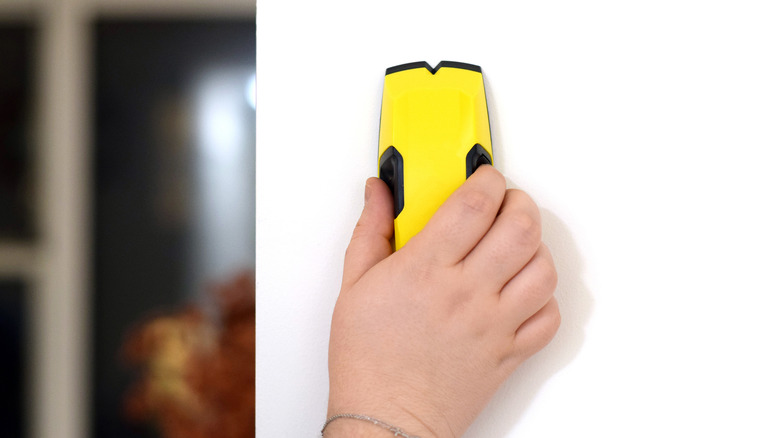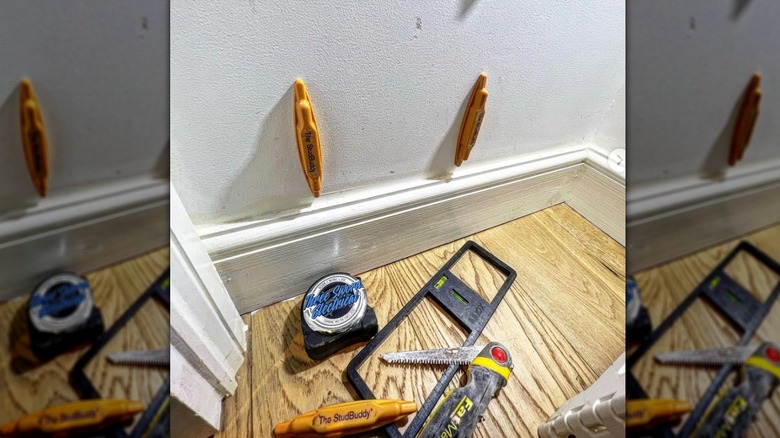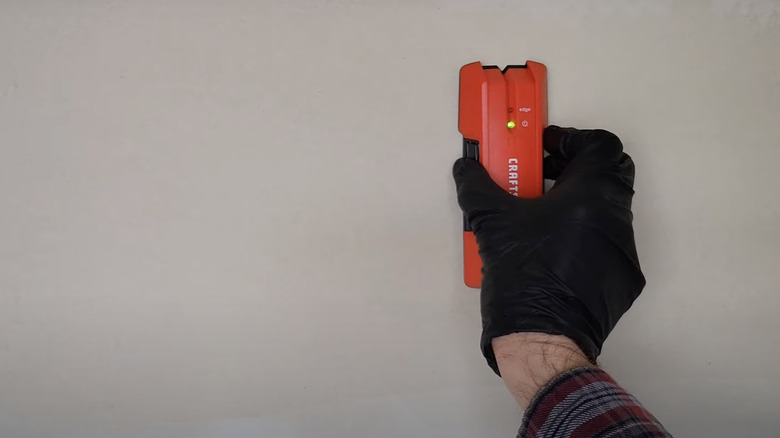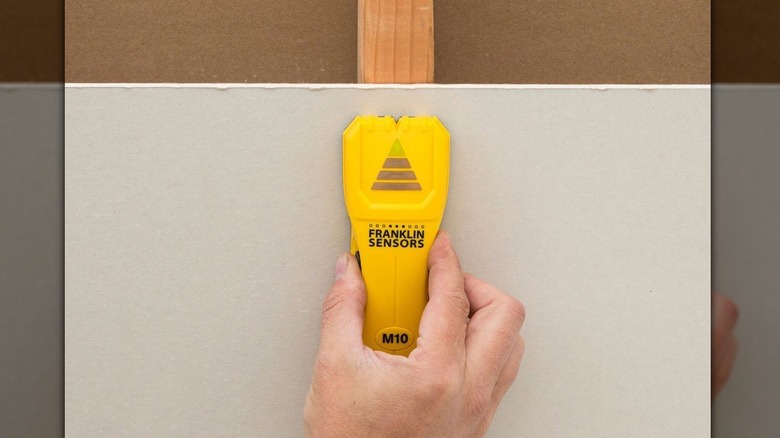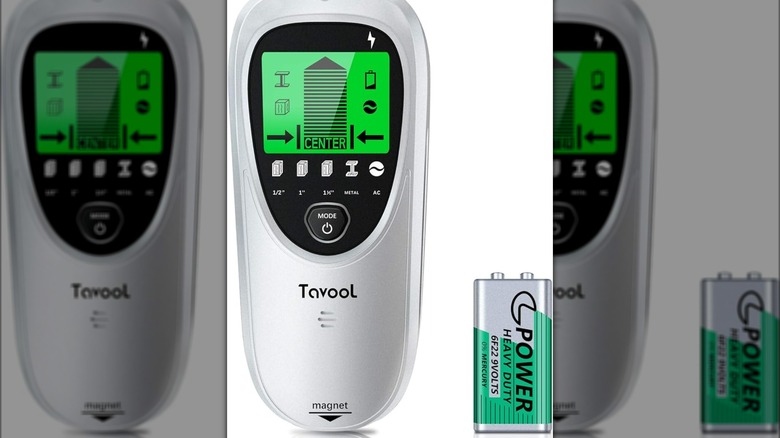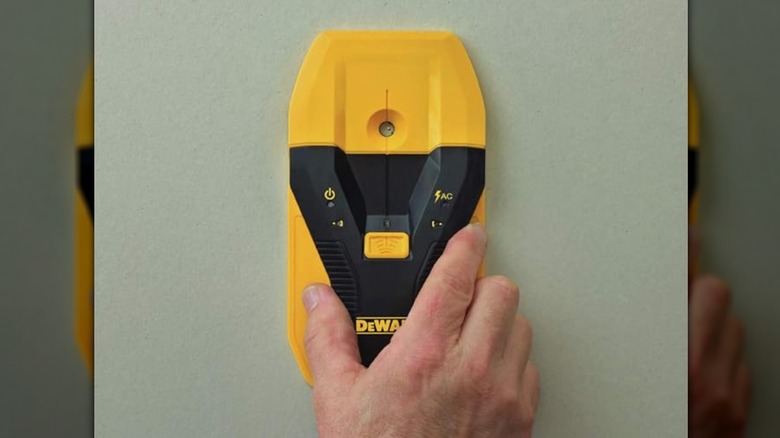The 5 Best Stud Finders You Can Buy Today At A Reasonable Price
We may receive a commission on purchases made from links.
Hanging wall art, televisions, shelves, and mirrors requires more than ensuring they're perfectly straight. Heavier items like TVs and mirrors should be attached to studs behind the wall, which will provide them with more support so they don't fall off. Studs are wood or metal vertical beams attached to drywall that make up the house's frame and hold up the walls. Since they're behind the walls, you can't see where the beams are, but using a stud finder can help you locate them. There are many stud finder options available from countless brands and at different prices. If you're on a budget, we've gathered the five best stud finders offered for a reasonable price, selected because of their overall positive reviews.
While some options will only help you find the studs, others have deep scanning and other features. If you do minor jobs around the house like hanging shelves, you won't need an extremely-expensive stud finder to find simple studs. Yet, if you regularly hang heavier items in your home, you might consider buying one with additional technological features. For instance, edge detection is a special feature that's only available with electronic types and locates the stud's edges to give you accurate measurements. Also keep in mind that there are two basic sensor types: electronic and magnetic. Electronic sensors can detect the studs and deeper materials in the wall, whereas magnetic sensors can only detect metal screws or nails in the beams and not entire beams.
1. The StudBuddy Magnetic Stud Finder
The StudBuddy is one of the most affordable stud finders, retailing for about $10 at Walmart. It's also one of the simplest types and can help you hang almost any heavy object on the wall, from cabinets to mirrors to flat-screen televisions. The simple stud finder is magnetic, so it doesn't require batteries and works by locating screws in studs that are behind drywall. However, it won't find studs behind plaster. Plus, it's small enough to carry in anything, especially your toolbox. The StudBuddy is well-liked at Walmart, where customers claim that it's an excellent tool for simple, straightforward projects around the house. They enjoy how easy it is to use and how it sticks to the wall since it's magnetic, allowing them to leave it on the wall in case they need to grab a pencil to mark the stud.
The downside to the StudBuddy is that it doesn't find the stud's center. Since it's magnetic and only finds nails and screws in the stud, this makes locating the edges and center trickier, especially if the connection is weak. Some folks said it took them a long time to find nails in the stud and for the stud finder to stick in the wall. But if you want to spend the least amount of money possible and just need a tool that helps you find where the studs are, the StudBuddy could be the ideal option for you.
2. Craftsman Stud Finder
If you typically hang heavier items around your house, the Craftsman stud finder has advanced sensor technology to help you find both wood and metal studs that are ¾-inch deep behind drywall. The Craftsman costs about $11 on Amazon, and customers enjoy the LED light indicators and audible alerts that tell you when the stud is located, making it effortless to use. You'll hear beeping sounds as you get closer to the stud. If you find the vertical beam on the first placement, it'll beep repeatedly throughout the wall, alerting you that it is there. It's perfect for beginners, DIYers, and artisans who need a simple tool to detect studs accurately.
However, the Craftsman stud finder requires 9V batteries, which aren't included when you buy the gadget. Further, a few buyers had trouble locating the studs because they didn't know they had to push down the side button the entire time for the stud finder to get accurate readings. Nonetheless, once they learned how to use it correctly, the tool typically found the studs fairly fast. You can easily use it to wall-mount TVs, curtains, and heavy mirrors.
3. Franklin Sensors ProSensor M10 Stud Finder
The Franklin Sensor stud finder has three sensors with multi-sense technology that help you find the stud's center fast. The triple sensors deeply scan the wall up to an inch deep to accurately find the studs. It retails for about $14 at Harbor Freight. Many customers claim they had no issues figuring out how to use this tool due to its simple instructions and were able to identify studs in the wall effortlessly. The stud finder has a red light that turns green when it marks the stud's center, making it easy to always have an accurate reading. However, it'll only find studs and won't find additional materials like screws or nails, since it's electronic.
Like many other electronic stud finders, the ProSensor requires but doesn't come with batteries, so you'll need to purchase them when you buy the tool or have some on hand at home. A few buyers also discussed that their stud finder located the same stud in two different places that were slightly near each other. If it finds the same stud in two different places, you can turn it off and then turn it back on or recalibrate it to find the single stud. Another customer said older homes with thicker wall material may have trouble using the ProSensor to find studs, so it may be best used only on drywall.
4. Tavool Stud Finder
If you want an electronic stud finder that comes with batteries and a large screen, you may want to choose the Tavool stud finder, which costs $20 on Amazon. This tool has multiple scanning modes that can detect wood, metal, and AC wiring at various depths. It's meant to scan up to 2-inches deep behind the wall to reach past the studs, wiring, and metal beams with its upgraded chips, but some customers found the deeper readings to be inaccurate. Because of this, it may work best when locating objects closer to the wall. However, the stud finder shows you the stud's width on the screen and tells you where the edges and center are. There is also a beeping feature that alerts you when you're getting close to the stud.
One feature that customers weren't a fan of was the calibration that occurs every time they turned on the tool. You have to wait until you hear a beep to begin locating the stud. If you don't wait for the calibration, you'll receive inaccurate readings, which will require you to restart the process. The bright side is that the calibration is automatic, so when you turn it on, it'll begin the process immediately. It can take a few seconds, but you'll find your studs almost instantly once it's ready to be used.
5. DeWalt DW0150 Stud Finder
One of the easiest stud finders to use that's slightly more expensive is the DeWalt DW0150 stud finder. It retails for around $32 at Home Depot and comes with batteries included. Overall, customers find this product to be reliable and easy to use. It has the capability of finding wood and metal studs through drywall. It also has a small hole in the middle where you can mark the stud's center, which it can easily locate even if the tool is held slightly-slanted, with a pencil. There are LED arrows that light up to let you know which direction the stud is, so you don't have to blindlessly move it back and forth along the wall.
Some customers said that they never have to check it twice to ensure this tool is reading the wall right. It also constantly calibrates while you use it, eliminating wait times. One Amazon buyer said it worked through their plastered wall, while most standard stud finders work primarily on drywall. On the other hand, the DeWalt stud finder claims that it can also detect AC wiring, but some customers on Home Depot's website thought it was too sensitive and wished that it would detect the wires better. However, because the device can detect the studs, you should typically be safe to drill shallow holes into the studs without hitting any wires, since the wires are located inside the studs and not on the front of them.
